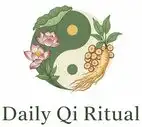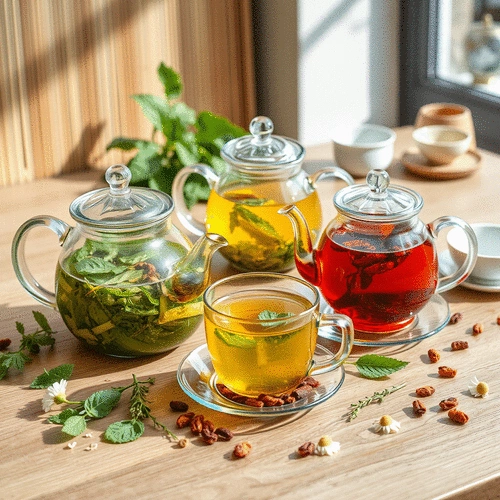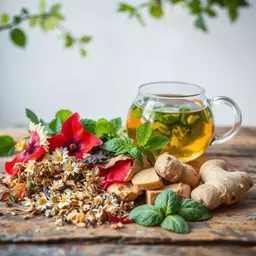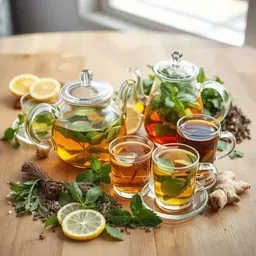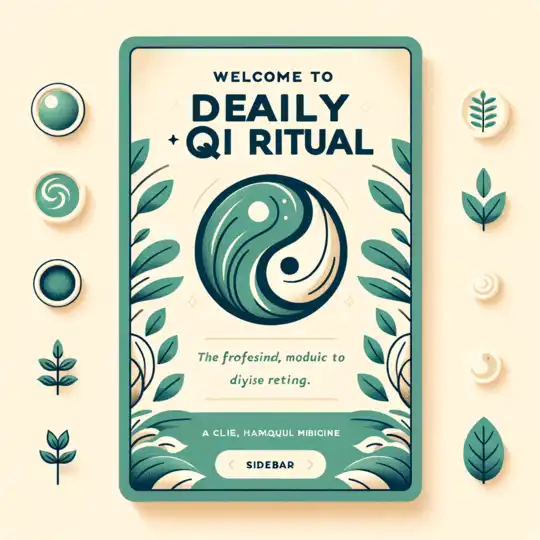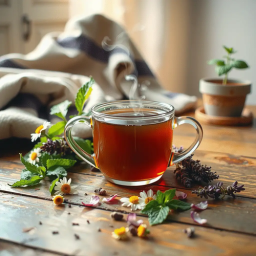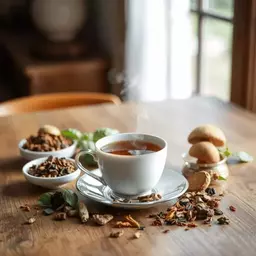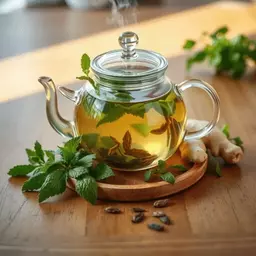As we navigate through a fast-paced world, the wisdom of ancient practices, such as Traditional Chinese Medicine (TCM), becomes increasingly relevant. Did you know that a simple cup of herbal tea can be a powerful ally in restoring balance to your body and mind? Discover how these time-honored traditions can enhance your well-being and connect you to a rich heritage of healing.
What You Will Learn
- Herbal teas are key to balancing Qi, which is essential for overall health and vitality.
- Understanding Yin and Yang and the Five Elements enhances your ability to choose the right herbal teas for your needs.
- Specific herbal teas, such as ginseng and ginger, possess anti-inflammatory properties, making them effective for physical discomfort.
- Regular consumption of herbal teas can lead to improvements in stress reduction and digestion.
- The historical context of herbal teas enriches our understanding and appreciation of their role in our lives.
- Exploring local sources for quality herbal teas supports your health journey and fosters community connections.
Key Benefits of Herbal Teas in TCM
Herbal teas offer numerous benefits vital for maintaining balance and promoting health in Traditional Chinese Medicine (TCM). Below is a comparison of some of the most significant benefits. For those interested in delving deeper, exploring how to incorporate TCM into daily life can provide further insights into holistic health practices.
Balancing Qi
Helps improve energy levels and overall vitality.
Stress Reduction
Promotes mental calmness and reduces anxiety.
Anti-Inflammatory Properties
Aids in alleviating physical discomfort and inflammation.
Improved Digestion
Supports digestive health and enhances Qi flow.
The Integral Role of Herbal Teas in Traditional Chinese Medicine
When we dive into the world of Traditional Chinese Medicine (TCM), we uncover a rich tapestry of philosophy and healing practices that have been cherished for centuries. Herbal teas play a significant role in this ancient wisdom, acting as bridges between nature and our well-being. At Daily Qi Ritual, we believe that understanding these practices can enrich our daily lives, inviting harmony and balance.
Understanding TCM and Its Philosophical Foundations
Introduction to Traditional Chinese Medicine (TCM)
At its core, TCM is a holistic system that views health as a balance of energy, or Qi. This energy flows through our bodies, influencing our physical, emotional, and spiritual health. By adopting principles from TCM, we can cultivate our Qi and enhance our overall well-being. Have you ever wondered how a simple cup of herbal tea can connect you to these age-old practices?
Key Concepts: Qi, Yin and Yang, and the Five Elements
To truly appreciate TCM, it's essential to grasp its foundational concepts, including Yin and Yang and the Five Elements: Wood, Fire, Earth, Metal, and Water. These elements represent different aspects of nature and our bodies. They interact dynamically, maintaining harmony. Understanding these relationships helps us choose herbal teas that resonate with our own energy needs! For a deeper dive into balancing these elements through mindful practices, consider exploring mindful practices for daily balance.
- Qi: The vital life force that flows through all living beings.
- Yin and Yang: The dual forces that represent balance; Yin is cool and passive, while Yang is warm and active.
- Five Elements: These elements govern the seasons, emotions, and even specific organs.
The Holistic Role of Herbal Teas in Balancing Qi
How Herbal Teas Contribute to Qi Balance
Herbal teas are more than just delightful beverages; they are powerful allies in harmonizing our Qi. Each blend carries specific properties that can either invigorate or soothe our energy. For instance, a warming ginger tea can invigorate the body, while calming chamomile can help you unwind and promote relaxation.
Therapeutic Effects on Stress Reduction and Inflammation
In today's fast-paced world, stress and inflammation can disrupt our Qi flow. The good news? Certain herbal teas are renowned for their therapeutic effects. For example, adaptogenic herbs such as ashwagandha and holy basil can ease stress responses, while anti-inflammatory herbs like turmeric can soothe physical discomfort. It's fascinating how nature provides us with these remedies!
- Stress Reduction: Herbal teas can calm the mind and body.
- Anti-Inflammatory Properties: Certain teas can help alleviate physical discomfort.
- Improved Digestion: Some blends support digestive health, enhancing Qi flow.
Key Herbal Teas for Qi Balance: Ginseng, Ginger, and Reishi Mushroom
Let's explore some of my favorite herbal teas that promote Qi balance. Each has unique properties that align with TCM principles:
- Ginseng: A powerful adaptogen that boosts energy and vitality.
- Ginger: Warming and stimulating, it supports digestion and circulation.
- Reishi Mushroom: Known for its calming effects, it helps reduce stress and enhance immunity.
At Daily Qi Ritual, I encourage you to experiment with these herbal teas. Not only will they support your well-being, but they also bring you closer to the principles of TCM! As we uncover the historical significance, scientific validations, and practical applications of these teas, it’s clear that they play an integral role in our journey towards balanced health.
A Historical Perspective on Medicinal Tea in TCM
The Evolution of Herbal Teas Through Chinese Dynasties
The use of herbal teas in TCM dates back thousands of years, evolving through various Chinese dynasties. Initially, they were consumed for their health benefits, later becoming a cherished part of daily rituals and social gatherings. Each dynasty contributed unique herbs and practices, enriching our contemporary understanding of these essential brews.
Integration of Tea with Medicinal Herbs for Therapeutic Use
Over time, herbal teas became integrated with medicinal practices, leading to the creation of complex formulas designed for specific health concerns. This blend of simplicity and complexity is what makes TCM so fascinating! Imagine sipping a warm tea that not only soothes your throat but also helps balance your Qi. For those seeking to deepen their understanding of TCM beyond teas, learning about acupuncture and what to expect can be incredibly beneficial.
Traditional Herbal Formulas: The Role of Licorice Root and Dong Quai
Among the many herbs used in TCM, licorice root and Dong Quai stand out for their balancing properties. Licorice root harmonizes other ingredients in herbal formulas, while Dong Quai is known as the "female ginseng," supporting women's health. These herbs remind us of the rich history and deep wisdom embedded within TCM practices.
- Licorice Root: Enhances the effects of other herbs.
- Dong Quai: Supports women's health and hormonal balance.
- Historical Richness: Each herb tells a story of ancient healing.
In conclusion, herbal teas are integral to Traditional Chinese Medicine, providing a natural pathway to balance and harmony. As we explore their role in our health journeys, let’s continue to honor the traditions that have brought us these remarkable practices. Remember, each sip is a connection to our ancestors and the wisdom they left for us! Join me in this journey of discovery at Daily Qi Ritual. You can also discover more about brewing traditional Chinese herbal teas to fully immerse yourself in the practice.
Frequently Asked Questions About Herbal Teas in TCM
- What is Qi and how do herbal teas balance it?
- Qi is the vital life force in TCM that flows through the body, influencing health. Herbal teas assist in balancing Qi by providing specific properties that either invigorate or soothe energy, promoting overall harmony and vitality.
- How do Yin and Yang and the Five Elements relate to choosing herbal teas?
- Understanding Yin (cool, passive) and Yang (warm, active), along with the Five Elements (Wood, Fire, Earth, Metal, Water), allows you to select herbal teas that align with your body's specific energy needs and imbalances, fostering harmony according to TCM principles.
- Which herbal teas are best for stress reduction and inflammation?
- For stress reduction, teas with adaptogenic herbs like ashwagandha and holy basil are beneficial. For anti-inflammatory properties, herbs such as turmeric and ginger are highly effective in alleviating physical discomfort.
- What are some historically significant herbs in TCM herbal teas?
- Historically significant herbs include licorice root, known for harmonizing other ingredients in formulas, and Dong Quai, often referred to as "female ginseng" for its support of women's health. Ginseng, ginger, and Reishi mushroom are also highly valued for their Qi-balancing properties.
- Can modern science validate the benefits of herbal teas in TCM?
- Yes, modern research continues to support many of the health claims associated with herbal teas. This blend of ancient wisdom and contemporary scientific understanding validates their role in enhancing well-being.
Pro Tip
Did you know? Pairing your herbal tea with mindful practices such as meditation or gentle yoga can amplify its benefits. By focusing on your breath and promoting relaxation, you can enhance the stress-relieving properties of teas like chamomile or linden. This holistic approach not only calms your mind but also allows your body to fully absorb the healing properties of the herbs.
Recap of the Significance of Herbal Teas in TCM
As we journey through the world of Traditional Chinese Medicine (TCM), it's clear that herbal teas play a crucial role in nurturing our well-being. These teas are not just delightful beverages; they are potent allies in restoring balance to our Qi and promoting overall health. By infusing our daily routines with these herbal wonders, we can tap into their myriad of benefits, from enhancing immunity to reducing stress.
Moreover, we’ve seen how history has shaped the use of these teas, blending ancient practices with modern discoveries. It's fascinating to observe how the wisdom of the past informs our understanding today. Incorporating herbal teas into our lives isn't just about following a trend; it's about embracing a lifestyle steeped in tradition and science.
Summary of Key Benefits and Insights
At Daily Qi Ritual, we believe in sharing the transformative power of herbal teas. Here are some key benefits and insights to remember as you explore this enriching practice:
- Herbal teas can help in balancing Qi, leading to improved energy and vitality.
- Many herbal teas, such as ginseng and ginger, are known for their anti-inflammatory properties.
- Regular consumption of specific teas can contribute to long-term health improvements, including stress reduction and enhanced digestion.
- Understanding the historical context of these teas enriches our appreciation and helps connect us to our cultural heritage.
As we reflect on these insights, it’s essential to recognize how modern research continues to back the health claims associated with herbal teas. The blending of ancient wisdom with contemporary science opens up a world of possibilities for enhancing our well-being.
Call to Action: Begin Your Journey with Herbal Teas
Now is the perfect time to dive into the vibrant world of herbal teas! I encourage you to experiment with some authentic recipes that resonate with your health goals. Why not start with a comforting cup of chamomile or a refreshing blend of ginger and lemon? Each sip is a step toward greater well-being!
Additionally, exploring local resources for quality herbal teas can enhance your experience. Look for specialty stores or farmers' markets that offer a variety of organic options. Supporting local businesses not only aids your health journey but also fosters community connections.
Further Reading and Resources for TCM Enthusiasts
If you’re eager to deepen your understanding of TCM and herbal teas, I have some wonderful resources to share. Here are a few recommendations:
- Books: Check out titles such as "The Web That Has No Weaver" by Ted J. Kaptchuk for a deep dive into TCM principles.
- Articles: Look for reputable online articles from TCM practitioners that discuss the benefits of specific herbs and teas. For example, you might find valuable information on herbal teas for daily wellness.
- Practitioner Connections: Seek guidance from local TCM practitioners and herbalists who can provide personalized advice tailored to your needs.
- Online Communities: Join forums and social media groups dedicated to herbal tea enthusiasts for support and shared experiences.
By engaging with these resources, you’ll embark on a journey not just of health, but of connection to a broader community that values the rich traditions of Traditional Chinese Medicine.
Recap of Key Points
Here is a quick recap of the important points discussed in the article:
- Herbal Teas and Qi: Herbal teas play a vital role in balancing Qi, enhancing overall health and vitality.
- Therapeutic Benefits: Many herbal teas, such as ginseng and ginger, possess anti-inflammatory properties and can help reduce stress.
- Historical Significance: The use of herbal teas has evolved through Chinese dynasties, integrating ancient wisdom with contemporary practices.
- Key Herbal Teas: Ginseng, ginger, and reishi mushroom are essential teas that promote Qi balance and well-being.
- Connection to Tradition: Incorporating herbal teas into daily life fosters a lifestyle rooted in both tradition and modern understanding.
